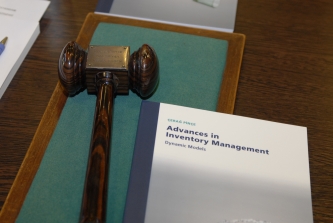Advances in Inventory Management Dynamic Models
 Due to rapid developments in technology and information systems, the speed and the nature of the flow of goods in supply chains have changed drastically. Today, to meet the increased customer expectations, companies need to offer larger assortments, shorter delivery times and better quality for lower prices. As more and newer products are developed and introduced to the markets, the average product life cycles got shorter. Obsolescence risk as well as demand uncertainty has increased significantly. The higher dynamism of markets made the costs more volatile and difficult to predict. As a result of these changes in the surrounding environment, inventory systems became more dynamic.
Due to rapid developments in technology and information systems, the speed and the nature of the flow of goods in supply chains have changed drastically. Today, to meet the increased customer expectations, companies need to offer larger assortments, shorter delivery times and better quality for lower prices. As more and newer products are developed and introduced to the markets, the average product life cycles got shorter. Obsolescence risk as well as demand uncertainty has increased significantly. The higher dynamism of markets made the costs more volatile and difficult to predict. As a result of these changes in the surrounding environment, inventory systems became more dynamic.
In this study <link erim events _blank>Advances in Inventory Management Dynamic Models, Pinçe developed and analyzed models incorporating two dynamic aspects affecting the inventory systems: nonstationarity in demand and unfixed purchasing prices.
In the first part, he considers an inventory system with a nonstationary demand rate. In particular, Pinçe focuses on critical service parts. Inventory management of such items is notoriously difficult due to their slow moving character, high downtime costs and high obsolescence risk. He proposes an obsolescence based control policy and investigate its impacts on costs. He finds that ignoring obsolescence increases costs significantly and an early adaptation of base stock levels can lead to important savings.
In the second part, Pinçe considers an inventory system where the supplier offers price discounts at random points in time. He extends the literature by assuming a more general backordering structure and demonstrates that allowing backorders in face of random deal offerings can result in considerable savings.
Çerağ Pinçe has defended his dissertation on June 24, 2010 at 09.30 hours at, Erasmus School of Economics, Erasmus University. His promoter is <link people rommert-dekker _blank>Prof.dr.ir. Rommert Dekker, Professor of Operations Research, Erasmus School of Economics, Erasmus University. Copromotor is Dr. Hans Frenk. Other members of the Doctoral Committee are Dr. Emre Berk, Dr. Roelof Kuik and Dr. Rob Zuidwijk.
About Çerağ Pinçe
Çerağ Pinçe (1976) received his BS degree in Statistics from Hacettepe University in 1999 and his MS degree in Industrial Engineering from Bilkent University in 2002. Before starting the PhD program at Erasmus University he was working as a researcher at the Algorithm Design and Test Department of the National Research Institute of Cryptology in Turkey.
His main research interests are inventory management, after sales service logistics and closed-loop supply chains. His research has been presented at major international conferences and workshops, such as INFORMS Annual Meeting, MSOM Annual Conference and ISIR 14th International Symposium on Inventories. His research leads to several papers one of which is published in European Journal of Operational Research. In 2008, he visited the College of Management at Georgia Institute of Technology as a research trainee for two months.
During his PhD, he had the opportunity to teach advanced inventory control and supply chain management courses at the Econometric Institute of Erasmus University. Besides that he delivered class sessions to logistics professionals at MEL program at Erasmus University and at the Master of Global Logistics Management program at Asia Pacific School of Logistics at Inha University, South Korea.
Abstract
In this study, we develop and analyze models incorporating some of the dynamic aspects of inventory systems. In particular, we focus on two major themes to be analyzed separately: nonstationarity in demand rate and unfixed purchasing prices.
 In the first part of the study, we consider an inventory system with a nonstationary demand rate. In particular, we consider critical service parts subject to obsolescence. Inventory management of such items is notoriously difficult due to their slow moving character and the high risks involved when they are not available or no more needed. In practice, there is a need for policies tailored for service parts taking these aspects into account and easy to implement. We propose an obsolescence based control policy and investigate its impacts on costs. We find that ignoring obsolescence in the control policy increases costs significantly and early adaptation of base stock levels can lead to important savings.
In the first part of the study, we consider an inventory system with a nonstationary demand rate. In particular, we consider critical service parts subject to obsolescence. Inventory management of such items is notoriously difficult due to their slow moving character and the high risks involved when they are not available or no more needed. In practice, there is a need for policies tailored for service parts taking these aspects into account and easy to implement. We propose an obsolescence based control policy and investigate its impacts on costs. We find that ignoring obsolescence in the control policy increases costs significantly and early adaptation of base stock levels can lead to important savings.
In the second part of the study, we consider an inventory system where the supplier offers price discounts at random points in time. We extend the literature by assuming a more general backordering structure. That is, when the system is out of stock, an arriving customer either decides to be backlogged with a certain probability or leaves the system and becomes a lost sale. We derive equations to calculate optimal policy parameters and demonstrate that allowing backorders in face of random deal offerings can result in considerable savings.
More Information
Pictures of the Event
Full Text of the Dissertation


